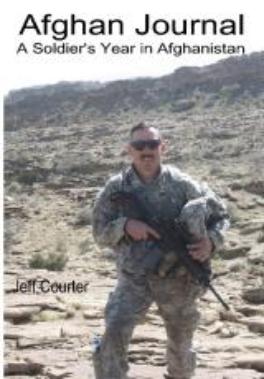 Guest reviewed by Nandini Pandya, who is currently working on “Abroad at Home,” a self-published anthology of works that appeared on Desijournal, an online magazine that she founded in 2002. Besides Desijournal, her writing has been published on Mostly Fiction.com, MothersMovement.org, India New England News and Alternet.org.
Guest reviewed by Nandini Pandya, who is currently working on “Abroad at Home,” a self-published anthology of works that appeared on Desijournal, an online magazine that she founded in 2002. Besides Desijournal, her writing has been published on Mostly Fiction.com, MothersMovement.org, India New England News and Alternet.org.
It is in books like Afghan Journal by Jeff Courter that self-publishing achieves its full potential. Without the ease of use and low entry cost of CreateSpace, a gem of a person would have remained hidden, and readers would have been deprived of a thoughtful and thought-provoking perspective on the war in Afghanistan.
Even though he was in his late forties, Jeff Courter enlisted with the Army National Guard out of a desire to serve his country. He did not let worries about how his wife and children would fend for themselves in his absence and the fear of not surviving his tour of duty in one piece stand in the way. During his training and subsequent one year deployment to Afghanistan, Courter kept a journal, and the book is a compilation of those journal entries.
In the opening entries Courter writes with feeling about his wife and children. He spends precious time “getting household repairs done, taking care of the myriad things we put off for later, because we can.”
Even though he realizes he is missing out on family time, he undertakes these tasks in order to ease their lives during his absence. These entries establish rapport between the writer and the reader. He is an ordinary family man who one can easily relate to, like a neighbor or a colleague. I found myself rooting for the guy through all his trials and tribulations: broken-down trucks and lack of equipment, no showers for weeks, getting shot at by the Taliban, and struggling to understand and be understood by the Afghan soldiers.
Because of the way the Iraq and Afghanistan wars have played out, most books about the wars dwell on the foreign policy big picture and analyses of what went wrong and who is to blame. The airwaves are flooded with summaries and author interviews that (because of the nature of the media) lack nuance. Depending on one’s political leaning a person’s reaction likely swings between the extremes of frustration/hand-wringing and angry refutations/rationalizations. Both views, unfortunately, end up in a quagmire of cynicism and hopelessness.
Courter’s book breaks this cycle. The tone of the book is honest, earnest and unassuming. It is a “boots on the ground” view of the challenges as well as the triumphs. The most refreshing aspect is that there is no political agenda.
I found his descriptions of Afghan society very insightful. For example, he describes how tribal allegiances and religious affiliations count for a lot more than ideas such as freedom of expression, and the rule of law. I was amazed to read that the Pashtun language has no word for “toy.” Towards the end of the book, Courter expresses a most profound thought:
If our ultimate purpose is to try to make this country a democracy similar to our own, we will fail miserably, in my opinion. Afghanistan has had no Enlightenment, and does not hold to the values of individual liberties and rights as we do. Nor does it appear they want to change their current tribal values and embrace ours. Unfortunately, freedom means allowing difference, and Afghans wish to remain different than us, for the most part. They want to be free to be the way they choose to be, not the way we want them to be.
The book also offers a unique peek into modern-day army life. At the base, the soldiers have almost all the conveniences of home such as Internet access, a variety of cuisines, a fully equipped gym and a church complete with stained glass windows. From his base in Afghanistan, Courter was able to order Christmas gifts for all his family members! On the other hand, when out in the country, even heat and hot water are hard to come by. He describes how he had to use baby wipes to “wash” his hair. In traveling a few hundred kilometers, it seemed that he was traveling centuries back in time.
Courter’s experiences after he got back to the United States are quite heart-breaking. Having lost his old civilian job he had a hard time finding a new job.
It occurs to me that the business interests we protect should be more interested in our employment and smooth transition to civilian life than anyone else. Unfortunately, this seems not to be the case.
He found that people quickly changed the subject when he started describing his experiences in Afghanistan. Neither his congressional representative nor the principal of his children’s school responded to his offers to share his experiences with them.
I have a couple of very minor quibbles with the book, both of which are very easy to fix. At almost 400 pages, the book tends to be somewhat repetitive in parts; it would benefit from tighter editing. At its current length, the inside margins are not sufficiently wide; the text curls too close to the binding.
But Jeff Courter deserves to be heard and heeded. Equally important, he deserves respect for the sacrifices that he willingly made in service of a higher purpose.
Go buy the book and read it!
Visit the author’s site at Afghanistan-Journal.com.
Get an Editorial Review | Get Amazon Sales & Reviews | Get Edited | Publish Your Book | Enter the SPR Book Awards | Other Marketing Services






















Leave A Comment